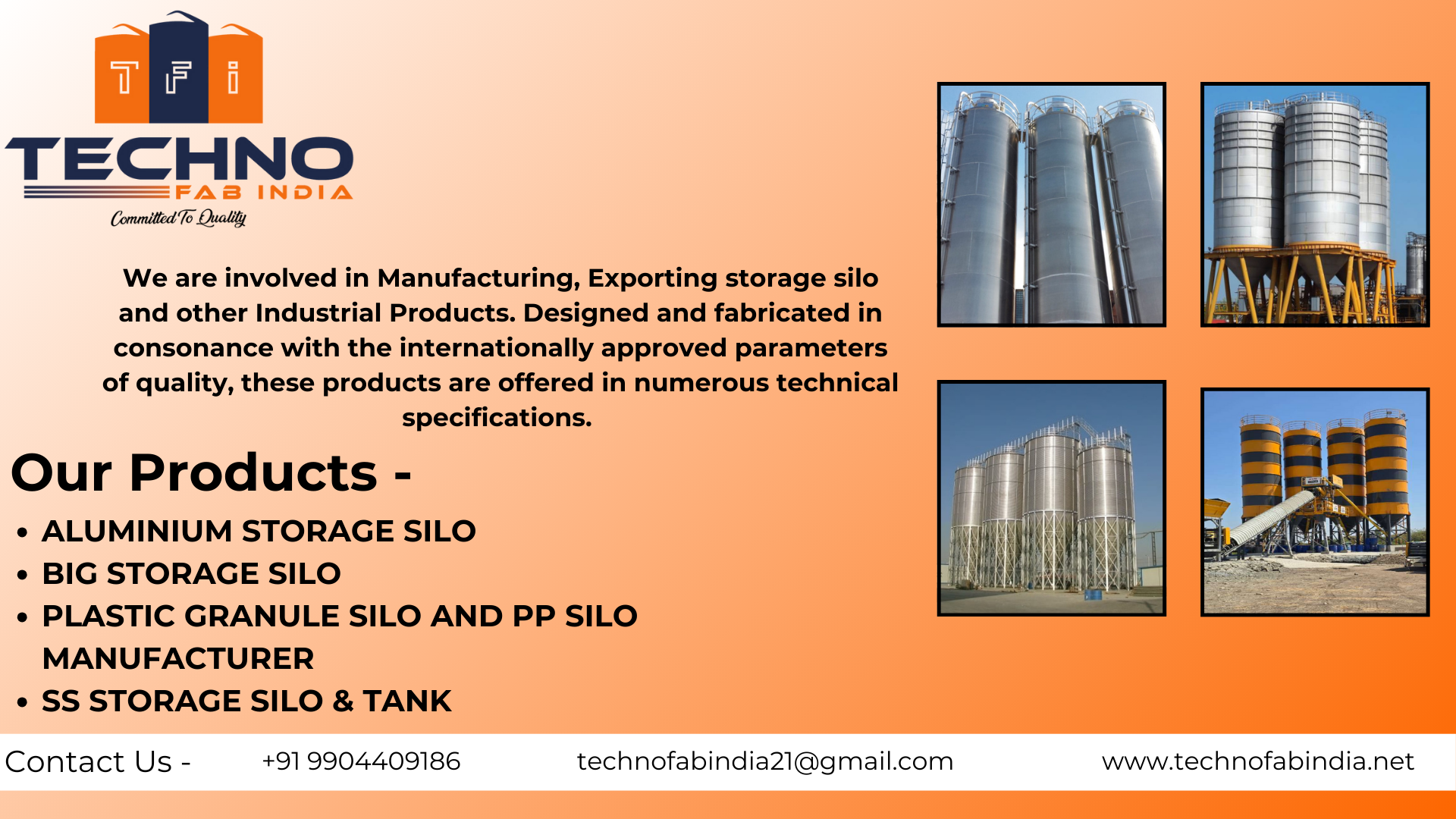
Grain Storage Silos Manufacturers in India
Grain Storage Silos Manufacturers in India
Description
Grain Storage Silos are large, airtight containers designed to store bulk quantities of grains such as wheat, maize, rice, barley, pulses, and oilseeds. They protect grains from pests, moisture, temperature variations, and other environmental factors that can degrade quality over time.
In India, silo manufacturers build these structures using advanced materials like galvanized steel or reinforced concrete, customized to meet storage capacity, safety norms, and climatic conditions. Silos are essential in modern agriculture supply chains for efficient grain management, preservation, and controlled distribution.
How It’s Made
Grain storage silos are manufactured using specialized engineering processes:
-
Material Selection:
High-tensile, galvanized steel sheets or reinforced concrete are used for the body. The materials are chosen for weather resistance, longevity, and strength. -
Design & Engineering:
The design includes cylindrical or square structures with conical/flat bottoms. CAD software is used for load calculations and structural integrity. -
Fabrication:
Pre-cut steel panels are roll-formed and bolted together on-site or preassembled. Corrugated or smooth wall designs are available. -
Foundation Construction:
Heavy-duty concrete base with anchor bolts is laid to support silo weight and load distribution. Ventilation & Aeration System:
Built-in blowers, air ducts, and vents ensure proper grain drying and prevent fungal growth.-
Sealing & Coating:
Special coatings or sealants are applied to make silos airtight and rust-resistant. -
Automation & Monitoring:
Modern silos include temperature sensors, grain level indicators, humidity controllers, and remote monitoring systems.
Where It’s Used
-
Agricultural co-operatives and FPOs
Food processing units
-
Seed processing plants
-
Grain exporters and logistics companies
-
Cattle and poultry feed mills
-
Flour and rice mills
-
Agro-storage terminals near ports and railways
-
Breweries and distilleries
-
Agri-tech firms managing farm-to-market operations
Key Features
-
Modular and scalable design
Galvanized steel with anti-corrosive coating
-
Flat or conical bottom for easy discharge
-
Built-in aeration, ventilation, and fumigation systems
-
Weatherproof roof structure
-
Grain level sensors and temperature monitoring
-
Easy assembly and relocation (for bolted silos)
-
Ladder and inspection platform for access
-
Complies with ISI and international safety standards
Importance
-
Ensures year-round grain availability despite seasonal harvest cycles
-
Prevents grain spoilage due to pests, mold, or moisture
Helps in buffer stocking for government and private sectors
-
Enables bulk handling and logistic efficiency
-
Protects against rising costs of temporary warehousing and wastage
-
Supports farmers, FPOs, and exporters in quality preservation
Advantages
-
Long-lasting storage solution (lifespan 25–40 years)
-
Reduces land usage compared to traditional godowns
-
Enhances grain quality by maintaining ideal storage conditions
-
Reduces manual labor through automated loading/unloading
-
Helps meet global export and food safety standards
-
Enables inventory planning, grain rotation, and first-in-first-out (FIFO) management
Withstand extreme weather — rains, heat, cold
-
Scalable as per crop yield and market demand
-
Easy integration with grain dryers, conveyors, and cleaning systems
Significance
Grain storage silos play a vital role in India’s agricultural ecosystem, especially where large-scale grain procurement, processing, and export take place. They are crucial for minimizing post-harvest losses — a long-standing issue in India.
With increasing grain production and government initiatives like PM SAMPADA and Digital India in Agriculture, modern silos bring automation, efficiency, and hygiene to food storage systems. Their relevance is rising rapidly due to the need for food safety, smart logistics, and supply chain resilience.
Why Choose Grain Storage Silos Manufacturers in India
-
Deep understanding of local climate and grain behavior
-
Cost-effective yet globally compliant silo systems
-
Expertise in both on-site and turnkey project execution
-
Use of high-quality galvanized or Zincalume steel
-
Customizable to crops, region, and volume
-
Skilled installation teams and AMC support
-
Technology integration: remote monitoring, SCADA, IoT
After-sales support, training, and maintenance services
-
Proven installations across India for private and government sectors
FAQs
-
What is the typical capacity of a grain silo?
Capacities range from 50 tons to 10,000+ tons, depending on design. -
Which grains can be stored in a silo?
Wheat, rice, maize, pulses, oilseeds, barley, and more. -
How long can grain be stored in a silo?
Up to 2–3 years with proper aeration and fumigation. Is fumigation necessary?
Yes, to prevent insects, mold, and bacteria from damaging grains.-
Are silos better than warehouses?
Yes — better space efficiency, less loss, and controlled environment. -
Can silos be relocated?
Bolted steel silos are modular and can be dismantled and relocated. -
Are these systems automated?
Many manufacturers offer fully automated monitoring and grain flow systems. -
What kind of foundation is needed?
A reinforced concrete base with anchoring bolts is used. -
What is the lifespan of a silo?
Galvanized steel silos can last 25–40 years with maintenance. -
Are Indian silo manufacturers globally competitive?
Yes, many are exporting to Africa, Southeast Asia, and the Middle East.
Conclusion
Grain Storage Silos are a future-ready solution to India’s growing agricultural storage and supply chain demands. They offer a scientific, scalable, and secure way of storing bulk grains with minimal losses and better quality preservation.
Leading manufacturers in India are building customized, automated, and durable silo systems that support farmers, processors, and government agencies alike — ensuring that no grain goes to waste and every harvest gets its full value.
Gmail:-technofabindia21@gmail.com
Quick Links
Our Products
Get In Touch
Plot No 4, Matruchhaya Ind Park, Nr. Kroma Paints, Dhamatvan-Vanch road, Dhamatvan Ahmedabad - 382440 Gujarat, INDIA.
technofabindia21@gmail.com
+91 9904409186
TECHNO FAB INDIA | All Rights Reserved.
